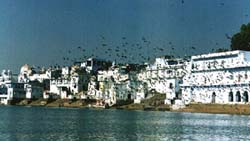 The Varah temple was built in the
12th century and, and the Mughal emperor Aurangzeb is said to have
destroyed it. Aurangzeb was understandably rather upset with the huge
statue of Varah, the god with the body of a man and the head of a boar.
However, Raja Sawai Jai Singh II of Jaipur thought differently, and in
1727 reconstructed the temple which now has a highly decorated inner
sanctum where an idol of Varah is placed.
The Varah temple was built in the
12th century and, and the Mughal emperor Aurangzeb is said to have
destroyed it. Aurangzeb was understandably rather upset with the huge
statue of Varah, the god with the body of a man and the head of a boar.
However, Raja Sawai Jai Singh II of Jaipur thought differently, and in
1727 reconstructed the temple which now has a highly decorated inner
sanctum where an idol of Varah is placed. The 19th century Mahadeva temple with its five-faced statue of Mahadeva is made entirely of white marble. The temple is remarkable for its elegance of structure, and is perhaps the finest of all temples in and around Ajmer and Pushkar.
The Ramavaikunth temple is an intricately carved temple dating to the 1920 and has images of 361 deities. Its high stone spires atop pagodas and the rest of the temple were built by masons especially brought for this purpose from south India. The Savitri temple is located on top of a hill overlooking the lake. The hike up the hill is long and arduous via a stairway built in the 4th century, and if panoramic views are a necessity for you, the trek will be worth it. This temple is dedicated to Brahma’s wife Savitri and its origin dates back to over 2,000 years.
The Gayatri temple on the other side of Pushkar is in honour of the wife who sat by Brahma’s side in Savitri’s absence during Brahma’s ceremonial sacrifice. Legend says that Gayatri was an untouchable and to purify her she was put into the mouth of a cow and taken out from the other end. To reach the Gayatri temple the best route to take is from behind the bus stand and walk up a hill. Both the Savitri and Gayatri temples are closed – so to say – during lunch hours and the best time to go is either before noon or in the evening.
Two Raghunath temples exist in Pushkar; one is the old one and the other is relatively new. The Old Raghunath temple was built in 1823 and houses images of Venugopal, Narasimha (Vishnu’s fourth incarnation) and Lakshmi, the goddess of wealth. But there’s a bit of a problem for foreign tourists visiting these two temples because of one little sign which says "Foreigners not allowed." These are probably the only binary temples in India where such segregation exists.
Towards the northen section of Pushkar is the Pap Mochini temple, not really popular for its architecture or deity but for the simple belief that anyone who kills a Brahmin will be purified of this deed by visiting the temple. Of course, all that was applicable in olden times, for today a murder is a murder and the law would hear nothing else.
Where there is a mass of holy water there will be bathing ghats, and in Pushkar it is the same as all over India. Pushkar lake is surrounded by hundreds of ghats where pilgrims assemble to bathe, pray or just loiter around. Removing ones shoes would be a good idea unless you want to be glared or shouted at! Photography is a strict no-no, especially of bathing women. Pushkar is quite used to tourists, but unlike Varanasi, is home for orthodox Hindus, and a little care to observe Hindu traditions can help.


